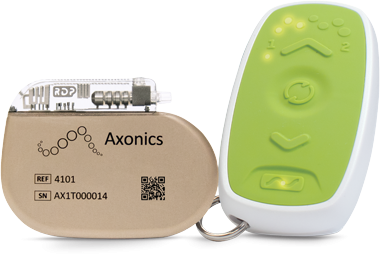Barely a month after winning FDA clearance for its long-lasting implant to treat bladder dysfunction, Axonics is wasting no time in bringing the device to the masses.
The Southern California-based company announced this week the commercial launch of its F15 neurostimulator across the U.S., targeting the tens of millions of people living with an overactive bladder or fecal incontinence.
The national rollout comes two weeks after Axonics introduced a direct-to-consumer advertising campaign for the device. The “Find Real Relief” TV spots, which will run through the end of the year, are specifically aimed at women with urinary incontinence, who the company said represent “a large and significantly undertreated” portion of the population.
“Physician response to the Axonics F15 has been overwhelmingly positive. Our sales team is now armed with a complete portfolio of [sacral neuromodulation] products that, along with our national DTC campaign, will contribute to Axonics achieving its mission of treating more adults suffering from incontinence,” said CEO Raymond Cohen.

The F15 system differs from its rechargeable predecessors in the neurostim space in that it’s designed to be implanted for upward of 15 years without ever requiring a recharge or replacement. That life span stretches to 20 years when energy-saving settings are used, per Axonics.
The 10-cubic-centimeter device is implanted near the sacral nerve, where it delivers a continuous current of electrical stimulation that’s meant to impede the abnormal neurological signals linked to fecal and urinary incontinence.
Patients can adjust the stimulation using a key-fob-sized remote controller—which, like the device it’s controlling, also eschews regular recharging—that also controls the implant’s “MRI mode,” allowing users to safely undergo full-body scans in both 1.5T and 3.0T machines.
“The Axonics recharge-free system is a welcome advancement for patients suffering from bladder and bowel dysfunction,” Taylor Moore, M.D., an Arkansas-based urologist, said in a statement. “My initial implants of the new device have gone well, with low amplitudes achieved at the time of implant suggesting longevity in the body of around 20 years.”
The F15 device was cleared by the FDA in early March, hot on the heels of the agency’s nod for Medtronic’s own recharge-free sacral neuromodulation implant for incontinence, which has also already begun its own commercial rollout.
Though the InterStim X mirrors the F15’s technological approach and MRI safety, it has a slightly larger profile than its competitor and offers a lifespan that maxes out at 15 years.